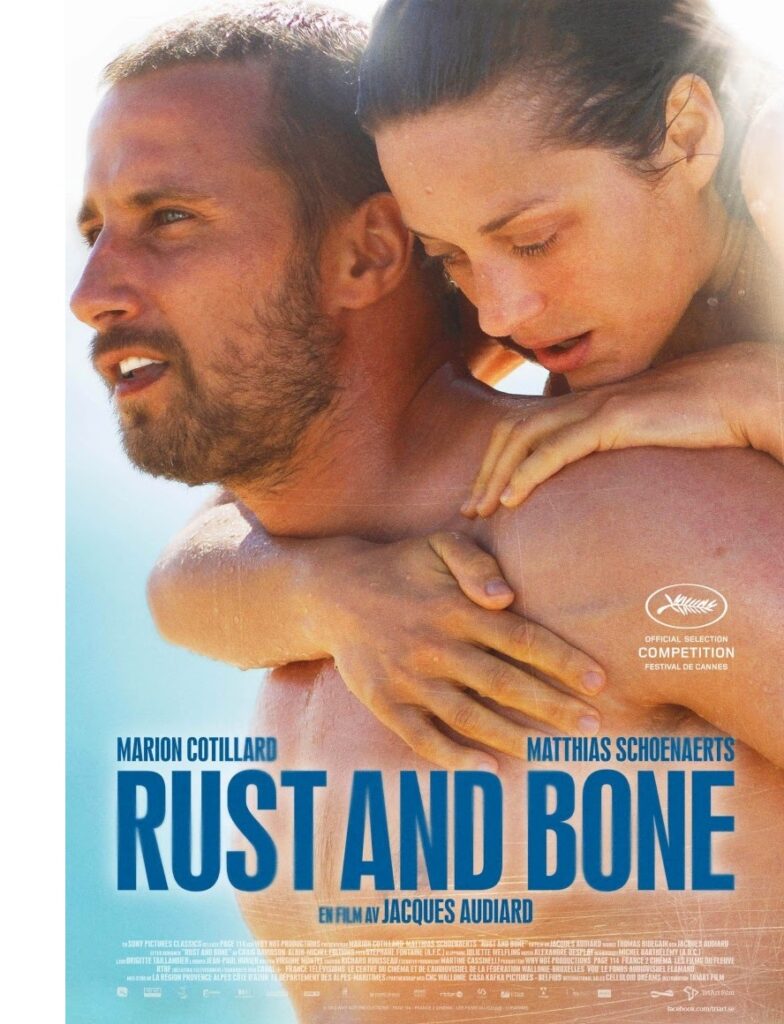In Rust and Bone, an amputee begins her emotional healing by reconnecting with her sexuality.

Few Americans had the chance to see Rust and Bone during its brief theatrical release in 2012, but the film drew gobs of attention overseas. A love story involving a bilateral leg amputee and a hard-luck kickboxer (see the irony?), Rust and Bone was nominated for the prestigious Palme d’Or at the Cannes Film Festival, then won four César Awards (the French equivalent of the Oscars) including a trophy for best screenplay. Within the U.S. it received nominations in the Golden Globes (best foreign-language picture), Independent Spirit Awards (best international picture), and Screen Actors Guild Awards (best actress).
One of the film’s two stars (Marion Cotilliard) is well known to U.S. audiences for her roles in the Christopher Nolan blockbusters Inception and The Dark Knight Rises. In Rust and Bone she plays Stephanie, a Marineland orca trainer who loses both legs at the knee when one of her whales miscalculates during a stunt—or, perhaps, deliberately rebels against her icy authority. Whatever the case, a woman who’s used to commanding five-ton beasts with a wave of her hand—and toying with men via her sexuality—must now regain mastery over her suddenly vulnerable, unfamiliar body.
A less imaginative film might have defaulted to the standard feel-good formula, a triumph over adversity. But Rust and Bone is less about triumph than transformation. Enter Ali, who represents a walking, talking version of one of Stephanie’s orcas: an agreeable brute, benevolent by nature but oblivious to the damage he carelessly (albeit unintentionally) leaves in his wake. He ekes out a subsistence (sort of) as a bouncer, security guard, and unlicensed back-alley brawler, piling up scar tissue with a nonchalance Stephanie can scarcely comprehend. Ali’s sheer physicality draws her out of her emotional shell and helps her reconnect with her senses. More important, it reactivates her sense of purpose and her own appetite for combat, which is not inconsiderable.
The film’s imagery is graphic, abetted by some marvelous special effects. We see Stephanie’s residual limbs thickly bandaged, coarsely stitched, and encased in plaster during a painful (and dehumanizing) prosthetic fitting. She straightforwardly exhibits her prosthetic legs to satisfy a child’s curiosity, but hides them under the bed in embarrassment the first time she and Ali sleep together. The lovemaking scenes are refreshingly matter-of-fact; they comes across as neither fetishized nor exploitative, depicting Stephanie’s renewed sexuality as perfectly normal—and integral to her healing. As one reviewer puts it: “Rust and Bone is a movie about letting go of shame and making way for the advent of pleasure.”
In the end, Rust and Bone’s portrayal of limb loss feels more honest than the artificially uplifting, “inspiration porn” disability tales that tend to draw big cineplex audiences. Stephanie’s journey is nonlinear, unglamorous, and riven by cross-cutting emotions. Whatever unexpected rewards she derives are hard-won and paid for in full; a happy ending never feels assured. Indeed, the film concludes on an ambiguous note. Far from having arrived at a settled resolution, Stephanie seems to be feeling her way forward toward an unknown destination—still healing, but justifiably hopeful.
Rust and Bone is in French, with subtitles. The script is based on two short stories by Canadian author Craig Davidson.
Where to see Rust and Bone:
Vudu
Fandango
Apple iTunes
Microsoft
Amazon
More about Rust and Bone:
Here’s an interview with Marion Cotilliard about how she prepared for her role as a bilateral amputee.
Disability Studies Quarterly offers some criticism of the movie’s portrayal of disability.
The two co-stars discuss the film, their characters, and director Jacques Audiard.
Get a short glimpse of the special effects that made able-bodied Marion Cotilliard look like a double amputee.
Male lead Matthias Schoenaerts talks about his hardscrabble character.